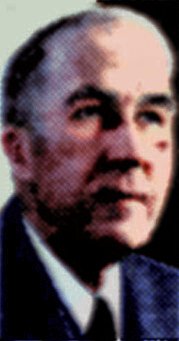British fear blow to security plans
Cabinet called – Eden to attend funeral
LONDON (UP) – Prime Minister Churchill called the British cabinet into special session today to consider the effect of President Roosevelt’s death, which many diplomats feared might have grave repercussions on world security plans.
Foreign Secretary Anthony Eden was named to represent the British government at Mr. Roosevelt’s funeral.
Mr. Churchill and King George led the British in paying tribute to Mr. Roosevelt. For the first time in history the House of Commons adjourned in observance of the death of an American President.
Eight-minute meeting
Commons met for eight minutes, heard Mr. Churchill speak briefly but feelingly, and adjourned. When it reconvenes next Tuesday, Mr. Churchill is expected to offer a traditional motion expressing sympathy to the King on the death of “his cousin” – the time-honored designation of the head of a great and friendly state.
Amid the mourning for Mr. Roosevelt, the realization persisted that the “Big Three” is dead with him. Diplomats felt that the peculiar personal type of negotiations of the Roosevelt-Churchill-Stalin triumvirate had passed away.
Whitehall and Allied government offices in London were filled with wonder at what would happen now.
Truman almost unknown
President Truman is virtually unknown in Britain. There was a fear born of uncertainty that he might be unable to get world security organization proposals through the U.S. Senate.
As one Allied government diplomat put it, “Everybody here rejoiced when Mr. Roosevelt was reelected, because we felt we knew what American policy would be for the next four years. But now we are confused.”
A high official of the Polish Foreign Office called the United Press today and asked, “Who will be the real power behind American foreign policy now?”
Mr. Churchill told Commons that Mr. Roosevelt’s “friendship for the cause of freedom and for the causes of the weak and poor won him immortal renown.”
Earlier, Mr. Churchill had cabled Mrs. Roosevelt that the President’s death was a “loss to the British nation and the cause of freedom in every land.”
King sends cable
King George cabled Mrs. Roosevelt that he and Queen Elizabeth were “deeply grieved and shocked” by news of the President’s death.
The British royal court suspended all activities for one week.
All the morning newspapers carried front-page editorials praising Mr. Roosevelt. Special editions were rushed to the streets at 1 a.m.
In Red Cross Clubs, public announcements were made – most of them twice, because nobody believed it the first time.
Telegram to Truman
King George sent a telegram to President Truman saying that his sorrow “will be shared by all my peoples who have long since felt that under President Roosevelt’s wise and understanding leadership problems of war and of the peace that is to follow were in the hands of one who had proved himself, in so signal a manner, to have at heart the welfare of mankind.”
It is especially grievous that at this moment, when forces of the Allies are bringing to a close the evil which has for so long overshadowed the continent of Europe, the knowledge and wise counsel of President Roosevelt should be taken from us…
